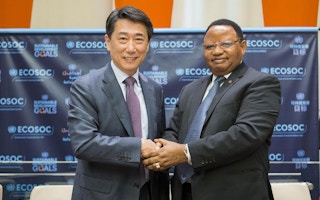Opening the first meeting of the 2017 session of the United Nations Economic and Social Council (ECOSOC), the body’s new President, Frederick Musiiwa Makamure Shava, of Zimbabwe, said that the Sustainable Development Goals (SDGs) are a “rallying call” to address the complex challenges facing the world.
He called for cooperation among UN Member States and for concerted action, at all levels, for effectively implementing the SDGs, which would complete the unfinished tasks of the Millennium Development Goals (MDGs) and realise the future we want.
“[The] spirit of cooperation and shared values has made it possible for us to envision a world where all challenges, however complex and resource intensive […] can be navigated successfully,” said Mr. Shava in his inaugural statement, referring to poverty eradication, climate change, humanitarian crises and breaches of peace and security.
To better focus the work of the main UN economic and social body, the President proposed that as its first priority, it should dedicate enough time to discuss the question of infrastructure development and industrialisation, especially in the context of support for African development and as a high priority for all the countries in special situations – the least developed countries, the landlocked developing countries, the small island developing States and those emerging from conflict.
“Funding for infrastructure projects is a challenge that has not yet been surmounted in Africa and most countries in special situations,” he said, emphasising that infrastructure and industrialisation are critical for the countries furthest behind.
“
There can be no sustainable development without peace and no peace without sustainable development.
Frederick Musiiwa Makamure Shava, president, United Nations Economic and Social Council (ECOSOC)
Mr. Shava further added that the nexus between development, human rights, peace and security should be recognised.
“There can be no sustainable development without peace and no peace without sustainable development,” he said, expressing his intent, as the President of the Council, to explore options for enhancing the partnership between ECOSOC and relevant UN bodies such as the Peacebuilding Commission on the interlinkages between development, peace and security.
Recalling that Member States of the UN recognised the role of ECOSOC as crucial in breaking silos and bridging divides across thematic issues, work pillars and governance structures, he said the body could consider how it could promote a strategic and coherent direction for the UN development system in this new development era.
“We already have very clear guidance on these issues. What is needed is to ensure that they are being implemented fully,” he concluded.
Also speaking at the occasion, outgoing President Oh Joon, of Republic of Korea, recalled that the 2016 session was a landmark year for the Council that saw the initiation of actions to implement the 2030 Agenda for Sustainable Development and other major global agreements of 2015.
Recalling, in particular, the High-level Political Forum on Sustainable Development held earlier in July, at the UN Headquarters in New York, on the theme ‘Ensuring that no one is left behind’, Mr. Oh said: “The national reviews of 22 volunteer countries have set an excellent stage for the follow-up and review of the SDGs for years to come.”
For further strengthening the work of ECOSOC, the outgoing President said that developing the structure of the ECOSOC system to make it fit for purpose, in the context of the entire UN development system, should be explored.
He further said that the agenda and the working methods of the Council should be reviewed in a systematic manner to ensure that no items remain “merely due to inertia, and added that a renewed spirit of cooperation is required to overcome the “outdated divide” between the groups of developed and developing countries.
Underscoring that the efforts and commitments of all Member States of the UN are critical to ensure win-win outcomes for the entire UN development system, let alone that of ECOSOC, Mr. Oh concluded, “The Council should by all means remain the central platform for collaboration of the global south and north.”
Mr. Oh served the ECOSOC Bureau for the past two and a half years, the first one and a half as Vice President and then for one year as its President.
This story was published with permission from the UN News Centre.










